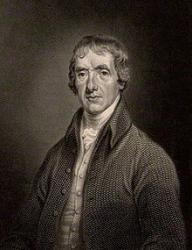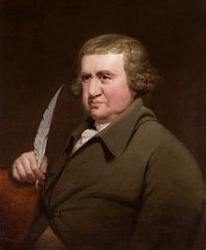Planning worship?
Check out our sister site, ZeteoSearch.org,
for 20+ additional resources related to your search.
- |
User Links
Person Results
‹ Return to hymnal


Export as CSV
Edmund Butcher
1757 - 1822 Person Name: Butcher Hymnal Number: 233 Author of "What works of wisdom, pow'r and love" in A Selection of Sacred Poetry Butcher, Edmund, born at Colchester, Essex, in 1757, and brought up as a linen-draper. After undergoing a preliminary training for the Unitarian Ministry, he was appointed to the charge of Leather Lane Chapel, Holborn, in 1789. From thence he removed to Sidbury Vale, Sidmouth, in 1798. Died April 14, 1822. Memoir in the Christian Moderator, 1827. His works include Picture of Sidmouth; Tour through various parts of England; Sermons, to which are added suitable Hymns, 1798; and the Substance of the Holy Scriptures Methodized, 1801. His hymns were given in the two latter works, in the Protestant Dissenters’ Magazine (of which he was some time editor); in Kippis's Collection, 1795; the Christian Guardian, 1802-1808; Aspland's Selection, 1810; and from his manuscript in Howse's Selection of Hymns and Psalms, 1837. They number 116 in all; but few, however, have attained to any position in modern hymnals. These include the following:
1. Blest is the man that [who] fears the Lord. Ps. cxii. Published in the Exeter Unitarian Collection, 1812, in 5 stanzas of 4 lines. It is in common use in Great Britain and America.
2. Father of all, where shall we find? Divine Worship. In Dr. Martineau's Hymns, 1840, &c.
3. Great God, as seasons disappear. Harvest. This is the most popular of his hymns. It is annotated under its first line.
4. Hosanna! let us join to sing. Resurrection. Contributed to Aspland's Selection, 1810, No. 290; and repeated in Dr. Martineau's Hymns, 1840, &c.
5. With deepest reverence at Thy throne. God's Unsearchableness. This is in American common use as in Laudes Domini, 1884, No. 248. It was contributed to Aspland's Selection, 1810, No. 146.
-- John Julian, Dictionary of Hymnology (1907)
Edmund Butcher
John Aikin

1747 - 1822 Person Name: Aikin Hymnal Number: 530 Author of "While sounds of war are heard around" in A Selection of Sacred Poetry Aikin, John, M.D., 1747-1822. The brother of Mrs. Barbauld,son or Dr. Aikin of the Warrington Academy. As a physician he practised at Warrington and Yarmouth, and from 1798 till the time of his death lived at Stoke Newington. Author (with his sister), of Evenings at Home, editor of the General Biographical Dictionary, and for some time of the Monthly Magazine. His hymn In time of war, "While [what] sounds of war are heard around," was very popular. It is in Kippis and Martineau’s Hymns for the Christian Church and Home.
--John Julian, Dictionary of Hymnology (1907)
John Aikin
Henry Grove
1683 - 1738 Person Name: Grove Hymnal Number: 68 Author of "O Lord, how excellent is thy name" in A Selection of Sacred Poetry Grove, Henry, 1683-1738. Presbyterian minister at Taunton, his birthplace, and conductor of a Dissenting Academy there, a contributor to Addison's Spectator (Nos. 588, 601, 626, and 635), and author of An Essay towards a Demonstration of the Soul's Immateriality, 1718; A Discourse of Secret Prayer, 1723; Some Thoughts concerning the Proofs of a Future State from Season, 1730; Miscellanies in Prose and Verse, 1739, including his Spectator papers; A System of Moral Philosophy, 1749, published by Dr. Amory, after his death, and various other works. There are two hymns of his in Pope's Collection, 1760:—
1. 0 Lord, how excellent thy name. God the Creator.
2. Before the Lord our Maker we. God the Preserver. (1) is in Kippis and Martineau’s Hymns for the Christian Church and Home; a selection from (2) in Aspland, and another selection beginning with st. 3, "The starry hosts in order move," in the Supplement to Kippis and in Wallace.
--John Julian, Dictionary of Hymnology (1907)
Henry Grove
Joseph Boyse
1660 - 1728 Person Name: Boyse Hymnal Number: 10 Author of "Come, pay the worship God requires" in A Selection of Sacred Poetry Boyse, Joseph, was born at Leeds in 1660, received a good education, and in 1683 became a Presbyterian minister in Dublin, a position he maintained with honour and usefulness until his death in 1728. His prose works, chiefly sermons and controversial treatises, were collected and published by himself in two large folios, London, 1728. He was the author of two collections of hymns. The first, printed in Dublin, in 1693 (small 8vo) with another title-page (London, 1693, Thomas Parkhurst, Cheapside), is entitled as follows:—
"Sacramental Hymns collected chiefly out of such passages of the New Testament as contain the most suitable matter of Divine Praises in the celebration of the Lord's Supper. To which is added one hymn relating to Baptism and another to the Ministry. By J. Boyse, with some by other hands."
Those by "other hands" are 3 in number, viz. one by G. Herbert, and two by Patrick. Of the remaining 21 by Boyse himself, 18 are for use at the Lord's Supper. From the fact that in the hymn on Baptism immersion is the only mode recognized, it is pretty certain that the author was Baptist in sentiment, though Presbyterian in ecclesiastical position. The other collection by Boyse was printed at Dublin in 1691. It contains 76 hymns, in three parts, with music, and is entitled: —
Family Hymn for Morning and Evening Worship, with some for the Lord's days . . . All taken out of the Psalms of David. A copy is in the Antrim Presbytery Library at Queen's College, Belfast.
Boyse's hymns are interesting from their early date, but have no merit as poetry. The hymn "Come pay the worship God requires" (Divine Worship), in Martineau's Hymns, 1840, No. 42, is by this author. [Rev. W. R. Stevenson, M.A.]
-- John Julian, Dictionary of Hymnology (1907)
Joseph Boyse
Erasmus Darwin

1732 - 1802 Person Name: Darwin Hymnal Number: 410 Author of "The Lord, how tender is his love" in A Selection of Sacred Poetry Darwin, Erasmus, M.D., 1732-1802. Physician and poet, of Lichfield, author of The Botanic Garden , 1781, &c. He was a friend of Dr. Priestley's, and in sympathy with many of his views, although not permanently connected with any church. His hymn on God, the disposer of events, “The Lord, how tender is his love," is in Kippis, Martineau’s Hymns for the Christian Church and Home & Martineau’s Hymns of Praise and Prayer gives another hymn on Immortal Nature, “Roll on, ye stars, exult in youthful prime."
--John Julian, Dictionary of Hymnology (1907)
Erasmus Darwin
S. Deacon
1746 - 1816 Person Name: Deacon Hymnal Number: 540 Author of "O for a plenitude of grace" in A Selection of Sacred Poetry Deacon, Samuel, born 1746, at Ratby, in Leicestershire, d. 1816 at Barton, near Market Bosworth, in the same county. He was son of Samuel Deacon, sen., one of the first preachers of the Leicestershire General Baptists; and half brother to John Deacon (q.v.) of Leicester. In 1771, S. Deacon settled at Barton, a small agricultural village, where, however, he presently established a considerable business as clock and watchmaker, and became well known for his mechanical skill. In 1779 he was invited to assist his father in ministering to the cluster of village congregations of General Baptists, of which Barton was the centre. He was popular and useful as a preacher, and continued minister of this church 37 years, receiving no pecuniary remuneration, but himself contributing liberally to various religious enterprises. In 1785 he published a volume entitled, A New Composition of Hymns & Poems chiefly on Divine Subjects; designed for the Amusement and Edification of Christians of all Denominations, more particularly them of the Baptist persuasion, Leicester: printed for the author by George Ireland. It contained 63 hymns, and 20 meditations. Subsequent editions were considerably enlarged, and the collection became known as the Barton Hymns, S. Deacon's style is very homely, and of his numerous hymns, "0 who can comprehend the rest" (Heaven), and "Ye heavy-laden souls" (Invitation), represent most, if not all, now in common use S. Deacon was also the author of several religious books, some very popular in their day, and most of them in metre, but they do not contain any of his hymns. [Rev. W. R. Stevenson, M.A.]
-- John Julian, Dictionary of Hymnology (1907)
S. Deacon
George Dyer
1755 - 1841 Person Name: Dyer Hymnal Number: 55 Author of "Greatest of beings, source of life" in A Selection of Sacred Poetry Dyer, George, B.A., 1755-1841. Educated at Christ's Hospital and Emmanuel College, Cambridge. The friend of Charles Lamb, of Priestley and Wakefield, and biographer of Robert Robinson of Cambridge. In 1792 he moved to London, to chambers in Clifford's Inn, Fleet Street, supporting himself by private tuition and literary work. He was a contributor to the Gentleman's and the Monthly Magazine, for which he wrote the introductory Ode in 1796. From 1809 to 1830 engaged upon Valpy's edition of the Classics, in 141 vols. Author of a History of the University and Colleges of Cambridge, 1814, and of several volumes of verse. Three of his hymns are in Kippis, and frequently in other books.
1. Greatest of beings, source of life. Hymn to the Deity.
2. Greatest of beings, source of life. The same continued.
3. Great Framer of unnumbered worlds. Hymn for a Fast
--John Julian, Dictionary of Hymnology (1907)
George Dyer
Mrs. Carter
Person Name: Carter Hymnal Number: 278 Author of "O thou, the wretched's sure retreat" in A Selection of Sacred Poetry
Mrs. Carter


 My Starred Hymns
My Starred Hymns


